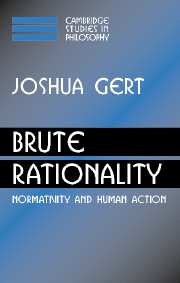Book contents
- Frontmatter
- Contents
- Preface and acknowledgements
- 1 What would an adequate theory of rationality be like?
- 2 Practical rationality, morality, and purely justificatory reasons
- 3 The criticism from internalism about practical reasons
- 4 A functional role analysis of reasons
- 5 Accounting for our actual normative judgments
- 6 Fitting the view into the contemporary debate
- 7 Two concepts of rationality
- 8 Internalism and different kinds of reasons
- 9 Brute rationality
- References
- Index
8 - Internalism and different kinds of reasons
Published online by Cambridge University Press: 22 September 2009
- Frontmatter
- Contents
- Preface and acknowledgements
- 1 What would an adequate theory of rationality be like?
- 2 Practical rationality, morality, and purely justificatory reasons
- 3 The criticism from internalism about practical reasons
- 4 A functional role analysis of reasons
- 5 Accounting for our actual normative judgments
- 6 Fitting the view into the contemporary debate
- 7 Two concepts of rationality
- 8 Internalism and different kinds of reasons
- 9 Brute rationality
- References
- Index
Summary
The purpose of the present chapter is to bring the requiring/justifying distinction to bear on a central controversy in contemporary ethical theory: the internalism/externalism debate. This debate concerns the nature of the relation between practical reasons and the desires of the agents who have those reasons. Crudely put, internalists hold that there is a very strong relation between the desires of a (rational) agent, and the reasons that such an agent has, while externalists hold that the reasons that an agent has are given by features of her situation in the world, and are independent of her attitudes towards those features. The nature of the relation between practical reasons and desire is of obvious relevance to a large number of central philosophical and practical questions, including the rational status of morally required behavior, and the reasonableness of punishing people who act in significantly immoral ways.
Parties to the internalism/externalism debate have typically assumed that, with regard to practical reasons, either internalism or externalism is correct. And they have assumed that if, for example, internalism should turn out to be the correct account, then there will be a single correct interpretation of internalism that holds for all practical reasons. In bringing the requiring/justifying distinction to bear on the internalism/externalism debate, one major point of this chapter is that these assumptions are almost certainly false, and that a failure to see this has hamstrung the discussion from the beginning.
- Type
- Chapter
- Information
- Brute RationalityNormativity and Human Action, pp. 167 - 185Publisher: Cambridge University PressPrint publication year: 2004



